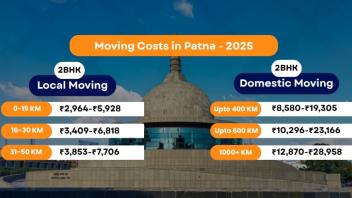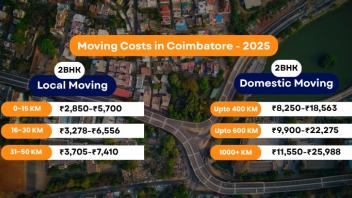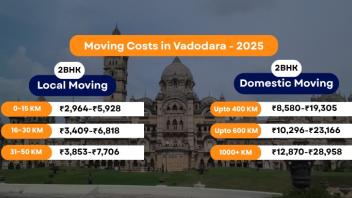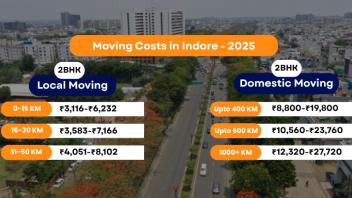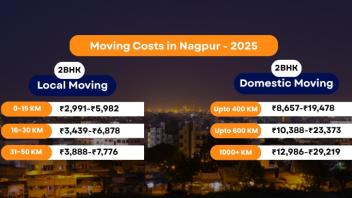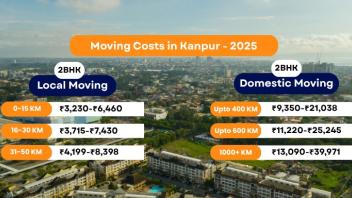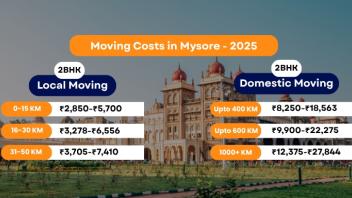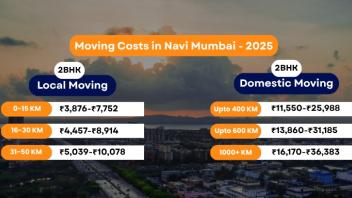How to Transport Your Car By Train in India? Steps and Cost
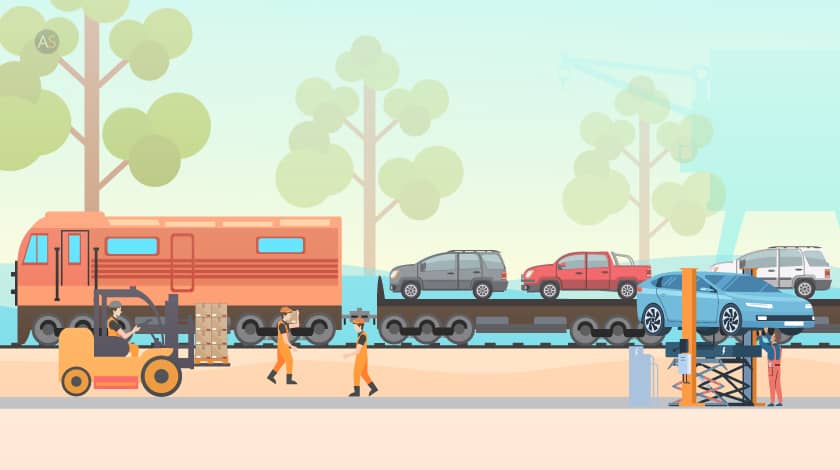
Among the various options available, car transport by train has emerged as a popular choice for many. It offers a more economical alternative to driving the car yourself or hiring a transporter.
In this blog, we will look further into the aspects of car transport by train in India, exploring the process, costs, and the pros and cons of this method.
Car Transport Options: Quick Comparison
Before diving into the details of train transport, here's a quick comparison to help you choose the right method for your needs:
| Factor | Train | Road Truck | Self-Drive |
|---|---|---|---|
| Cost | ₹8,000 - ₹19,000 | ₹10,000 - ₹25,000 | ₹15,000 - ₹30,000 |
| Time | 5-10 days | 3-7 days | 2-4 days |
| Safety | High | Medium-High | Medium |
| Convenience | Medium | High | Low |
| Best For | Budget moves | Quick relocations | Road trips |
Now that you have a clear comparison, let's explore the train transport process in detail.
The Process of Car Transport by Train
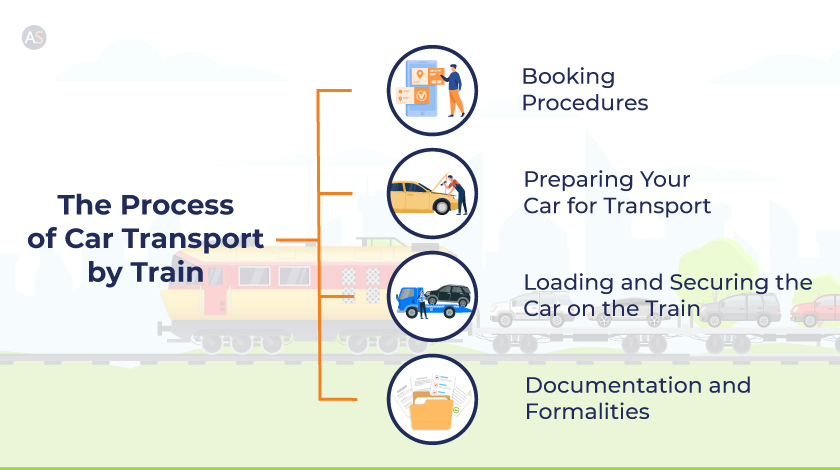
Transporting your car by train in India is a process that involves several key steps, each crucial for ensuring a smooth and hassle-free experience. Here's a step-by-step guide to help you navigate through the entire process of how to transport car by train:
1. Booking Procedures
The journey begins with booking your car's transportation. This can be done at the parcel office of the respective railway station or through the official Indian Railways parcel booking portal. It's advisable to book at least a week in advance, especially during peak seasons, to secure a spot for your vehicle. You will need to provide details such as the make and model of your car, the destination station, and your preferred dates of transport. Some railway zones also offer online booking facilities, which can be a convenient option.
However, booking and transporting your car by train can be quite time-consuming and complex. Why spend your valuable time navigating the tedious procedures when you can let the experts handle everything for you?
2. Preparing Your Car for Transport
Before handing over your car for transportation, certain preparations are necessary. If you're relocating to a new city, these car relocation tips will help ensure your vehicle reaches safely:
- Clean your car: This makes it easier to inspect and identify any existing damages or scratches before the transport.
- Document the condition: Take photos of your car from different angles for a record of its pre-transport condition.
- Remove personal belongings: Ensure that your car is empty of personal items and valuables.
- Check for leaks: Any fluid leaks should be fixed as they might pose a hazard during transportation.
- Fuel level: It's recommended to keep the fuel level low (about a quarter of the tank) to reduce weight and risk.
3. Loading and Securing the Car on the Train
On the day of transport, your car will be driven to the railway loading area. The railway staff will then load your car onto a specialized car carrier wagon. These wagons are designed to securely hold vehicles in place during transit. The car is typically secured using wheel jammers and chains to prevent any movement while the train is in motion. It's important to ensure that the car is properly secured and balanced on the wagon.
4. Documentation and Formalities
Several documents are required to transport your car by train in India:
- Vehicle Registration Certificate (RC): To prove ownership of the vehicle.
- Insurance Certificate: To ensure the car is insured against any transit damage.
- Emission Certificate: To verify that your vehicle meets environmental standards.
- Identity Proof: A copy of your Aadhar Card, PAN Card, or any government-issued ID.
- Transportation Form: Filled at the parcel office, detailing the transport agreement.
Cost Analysis of Car Transportation by Train in India
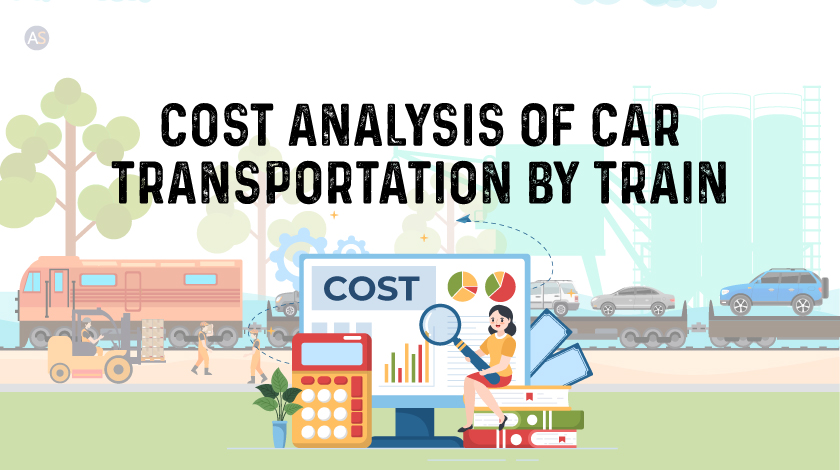
Understanding the cost implications of transporting a car by train in India is crucial for anyone considering this option. The costs can vary significantly based on several factors, including the departure and arrival cities, the type of car, and additional services like insurance. Here, we provide a comparative cost analysis from various major cities, delve into the factors affecting the cost, and present some example scenarios with estimated prices for 2026.
Comparative Cost Analysis of Car Transport from Major Cities
The cost of transporting a car by train in India varies depending on the origin and destination cities. Here's a general overview from some major cities as of 2026:
- Delhi to Mumbai: The cost for transporting a standard-sized car (like a Maruti Suzuki Swift) can range from INR 8,000 to INR 13,000.
- Mumbai to Kolkata: For a similar car, the cost may range between INR 9,000 to INR 15,000.
- Kolkata to Chennai: Expect to pay around INR 10,000 to INR 16,000.
- Chennai to Bangalore: Being a shorter distance, the cost might range from INR 5,500 to INR 9,000.
- Bangalore to Delhi: For this longer route, the cost could be anywhere between INR 13,000 to INR 19,000.
Factors Affecting the Cost of Car Transportation by Train
Several factors influence the cost of transporting a car by train in India:
- Distance: The longer the distance, the higher the cost. Transporting a car from Bangalore to Delhi will be more expensive than from Chennai to Bangalore.
- Car Type and Size: Larger vehicles like SUVs and luxury cars cost more to transport due to their size and the extra care needed in handling.
- Insurance: Opting for transit insurance (highly recommended) will add to the cost but provides peace of mind against potential damages.
- Service Type: Some services may offer door-to-door delivery, which includes picking up the car from your home and delivering it to the desired location. This convenience comes at an additional cost.
- Seasonal Variations: During peak seasons, prices may be higher due to increased demand.
Want to know how to reduce your expenses? Check out these tips to reduce car relocation costs.
Example Scenarios with Estimated Cost
To give you a better idea, here are a few hypothetical scenarios for 2026:
Scenario 1: Standard Car from Delhi to Mumbai
- Car Type: Hatchback (e.g., Maruti Suzuki Swift)
- Distance: Approx. 1,400 km
- Estimated Cost: INR 8,000 - INR 13,000
Scenario 2: SUV from Mumbai to Kolkata
- Car Type: SUV (e.g., Toyota Fortuner)
- Distance: Approx. 2,000 km
- Estimated Cost: INR 12,000 - INR 18,000
Scenario 3: Luxury Car from Bangalore to Delhi
- Car Type: Luxury Sedan (e.g., BMW 5 Series)
- Distance: Approx. 2,150 km
- Estimated Cost: INR 15,000 - INR 23,000
Pros and Cons of Car Transport by Train
Transporting a car by train in India is a viable option for many, but like any mode of transportation, it comes with its own set of advantages and disadvantages. Understanding these can help you make an informed decision about whether this method suits your needs. Here, we explore the pros and cons of car transport by train.
Pros
- Cost-Effectiveness: Compared to other modes of transport, such as driving the car yourself or using road transport services, transporting a car by train is often more economical, especially for long distances.
- Safety and Security: Trains offer a secure environment for transporting vehicles. The risk of accidents and theft is generally lower compared to road transport. Cars are securely fastened and monitored throughout the journey.
- Environmental Benefits: Train transport is more environmentally friendly than road transport. Trains emit significantly less carbon dioxide per ton-mile, making this a greener choice for those conscious about their carbon footprint.
- Accessibility and Network Reach: The extensive railway network in India ensures that even remote locations are accessible. This wide reach makes it a convenient option for transporting vehicles across different parts of the country.
Cons
- Time Considerations: Transporting a car by train can be time-consuming. The process involves not just the travel time but also time for booking, loading, and unloading. It's generally slower than direct road transport.
- Limited Flexibility and Control: Once the car is loaded onto the train, you have little control over the transit process. Unlike personal driving or hiring a driver, you can't make stops or change the route.
- Potential for Delays and Damage: While generally safe, there is always a risk of delays due to logistical issues or damage during loading and unloading. These incidents, though rare, can be inconvenient and potentially costly. Learn about common car transport mistakes to avoid for a smoother experience.
- Restrictions and Limitations: There are limitations on the size and type of vehicle that can be transported by train. Oversized vehicles or those with special requirements may not be accommodated. Additionally, certain routes may not be available for all types of vehicles.
Wondering whether to choose open or closed transportation? Read our guide on car transport open vs closed truck to make an informed decision.
Preparing Your Car for Train Transport
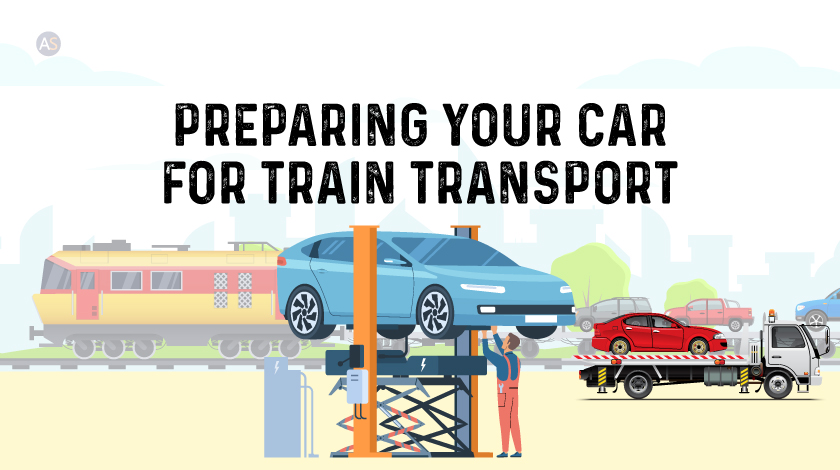
Ensuring your car is adequately prepared for train transport is crucial for a smooth and hassle-free experience. Proper preparation not only safeguards your vehicle but also helps in complying with the regulations set by the railway authorities. Here are the essential steps and tips to prepare your car for train transport in India.
Necessary Checks and Preparations
- Mechanical Check-Up: Ensure your car is in good working condition. Check the brakes, battery, and tires. Any mechanical issues should be fixed beforehand to avoid complications during loading and unloading.
- Clean Your Car: A clean car makes it easier to spot any damages that might occur during transport. Wash both the exterior and interior of the vehicle.
- Document Existing Damages: Take detailed photos or videos of your car from various angles. Note any existing scratches, dents, or damages. This documentation will be crucial if you need to file a claim for any transport-related damages.
- Fuel Level: Reduce the fuel level to about a quarter of the tank. This minimizes weight and reduces the risk of leaks during transport.
- Disable Alarm Systems: To prevent any unnecessary triggers during the journey, make sure to disable your car's alarm system.
- Check Fluids: Ensure that all fluids (oil, coolant, etc.) are at appropriate levels and that there are no leaks.
Insurance and Safety Measures
- Transit Insurance: Opt for transit insurance to cover any potential damages during transport. While railway services offer a basic level of insurance, it might be beneficial to have additional coverage for complete peace of mind.
- Review Insurance Policy: Understand the terms and conditions of the insurance policy. Know what is covered and what isn't, and the process for filing a claim, if necessary.
Tips for Securing Personal Belongings
- Remove Personal Items: Clear out all personal belongings from the car. Personal items are not covered by insurance, and they might shift during transit, causing damage to the vehicle's interior.
- Secure Loose Parts: If your car has any loose parts or accessories (like antennas, spoilers, or external mirrors), secure them properly or remove them if possible.
- Lock the Car: Once the car is loaded onto the train, ensure it is locked. This prevents any unauthorized access during transit.
- Keep a Spare Key: Always keep a spare key with you. Do not leave the only set of keys in the car.
- Documentation: Keep copies of all relevant documents, including registration, insurance, and transport paperwork, in a safe place.
If you're moving to a new climate, don't forget to check these car maintenance tips for new climates to keep your vehicle in top condition.
Common Issues and Solutions in Car Transport by Train
While transporting your car by train is generally smooth, being prepared for potential challenges can save you time and stress. Here are the most common issues people face and their practical solutions:
Issue 1: Delayed Delivery
What causes it: Train schedule changes, logistical delays, weather conditions, or technical issues with the railway system.
Solution:
- Always add a buffer of 3-5 days to your expected delivery date when planning your relocation
- Track your consignment using the Railway Receipt (RR) number through the railway parcel office
- Contact the destination parcel office if the delay exceeds the estimated time
- Keep copies of all booking documents for follow-up inquiries
- Stay in regular touch with the railway parcel office for status updates
Issue 2: Car Damaged During Transit
What causes it: Improper loading/unloading, loose fastening, or mishandling by railway staff.
Solution:
- Take detailed photographs and videos of your car from all angles before handing it over
- Inspect your car thoroughly immediately upon delivery at the destination
- If damage is found, DO NOT take delivery - note the damage in writing with railway staff present
- File a claim immediately at the parcel office with photographic evidence
- Contact your transit insurance provider within 24 hours with all documentation
- Keep the Railway Receipt, insurance documents, and damage photos ready for claim processing
Issue 3: Missing or Incomplete Documentation
What causes it: Misplaced papers, unclear documentation requirements, or last-minute booking rush.
Solution:
- Prepare a complete document checklist at least one week before transport
- Keep both physical and digital (scanned) copies of all documents
- If RC or insurance is under renewal, get temporary certificates from authorities
- Carry multiple photocopies of each document to the parcel office
- Double-check document validity dates before booking
Issue 4: Car Not Accepted at Parcel Office
What causes it: Expired PUC certificate, vehicle modifications, fuel tank issues, or documentation problems.
Solution:
- Verify all certificate validity dates at least 2 weeks before booking
- Get PUC renewed if it's close to expiry date
- Remove any non-standard modifications or get necessary approvals
- Ensure fuel level is at recommended quarter-tank or less
- Call the parcel office beforehand to confirm specific requirements for your car type
Issue 5: Difficulty in Claiming Insurance
What causes it: Insufficient evidence, unclear damage assessment, or incomplete claim documentation.
Solution:
- Read and understand your insurance policy terms before transport
- Document every scratch and dent with timestamped photos before transport
- Get damage assessed by railway authorities immediately upon discovery
- File claims promptly - most policies have strict timelines (24-48 hours)
- Keep all original documents including RR, insurance certificate, and damage reports
- Follow up regularly with both railway and insurance company
Issue 6: Booking Unavailability During Peak Season
What causes it: High demand during summer (April-June) and festival seasons.
Solution:
- Book at least 2-3 weeks in advance during peak seasons
- Consider alternative departure dates if your preferred date is unavailable
- Check with multiple railway zones as availability varies
- Have backup transport options ready (road transport services)
- Plan your relocation during off-peak months (July-March) if possible
Issue 7: Car Keys Locked Inside or Lost
What causes it: Human error during the loading process or misplaced keys.
Solution:
- Always keep a spare key with you - never send all keys with the car
- Hand over only one key to railway staff and keep the spare separate
- Label keys clearly but without revealing sensitive vehicle information
- If keys are lost, contact a professional locksmith at the destination
- Keep your car's key code information saved digitally for emergency key cutting
Pro Tips to Avoid Issues:
- Choose off-peak travel times when possible for better service and availability
- Personally supervise the loading process if allowed by railway authorities
- Get contact details of the destination parcel office before transport begins
- Pay extra for comprehensive insurance - it's worth the peace of mind
- Join online forums or groups to learn from others' experiences with specific routes
- Keep emergency funds aside for unexpected expenses or delays
Being aware of these common issues and having solutions ready will help ensure your car transport experience is as smooth as possible.
Legal Aspects of Car Transport by Train in India
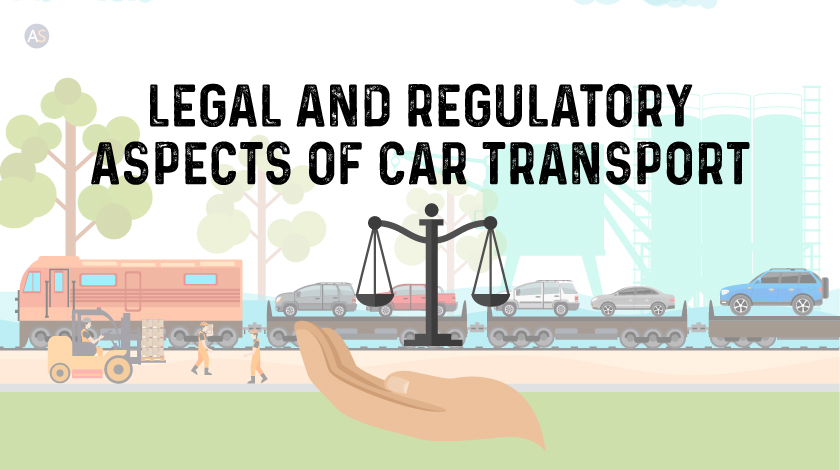
Navigating the legal and regulatory framework is a critical aspect of transporting your car by train in India. Understanding these requirements ensures compliance with the law and a smooth transportation process. This section outlines the key legal considerations and the necessary documentation required for train-based car transport.
Understanding the Legal Framework
- Railway Regulations: The Indian Railways, governed by the Ministry of Railways, has specific regulations for transporting vehicles. These regulations cover aspects like the type of vehicles allowed, packaging standards, liability in case of damage, and insurance requirements. You can check the latest guidelines on the Indian Railways parcel service website.
- Liability and Insurance Laws: The Indian Railways Act and related regulations outline the liability of the railways in case of loss or damage to goods (including vehicles) during transit. It's important to understand the extent of railway liability and the need for additional insurance.
- Environmental Compliance: Vehicles transported must comply with the emission standards set by the Central Pollution Control Board. Ensure your vehicle has a valid Pollution Under Control (PUC) certificate.
- Interstate Regulations: When transporting across states, be aware of any specific regulations that might apply, such as entry taxes or permits for certain types of vehicles.
Necessary Documentation and Compliance
- Vehicle Registration Certificate (RC): This is the primary document proving your ownership of the vehicle. Ensure it is valid and up-to-date.
- Insurance Certificate: Your vehicle should have an active insurance policy. This is crucial not only for legal compliance but also for claiming compensation in case of any damage during transit.
- Emission Certificate: A valid PUC certificate is mandatory to comply with environmental regulations.
- Identity Proof: A government-issued ID card (like Aadhaar, PAN, or Passport) is required for verification purposes.
- Transportation Form: This form, provided by the railway parcel office, details the terms and conditions of the transport service. It must be filled out accurately and submitted along with the other documents.
- No Objection Certificate (NOC): In certain cases, especially if the car is under a loan or hypothecation, an NOC from the financier may be required.
- Booking Receipt/Railway Receipt (RR): This is issued by the railway parcel office upon booking and is a crucial document for tracking and claiming your vehicle at the destination.
(Tip: Rather than choosing car transport by train, one can hire any professional car transport service for a safe and hassle free transport.)
Frequently Asked Questions About Car Transport by Train
1. How much does it cost to transport a car by train in India in 2026?
The cost varies based on distance, car type, and route. As of 2026, transporting a standard hatchback from Delhi to Mumbai costs between INR 8,000 to INR 13,000, while longer routes like Bangalore to Delhi can cost INR 13,000 to INR 19,000. SUVs and luxury cars cost more due to their size and handling requirements.
2. How long does it take to transport a car by train?
The transit time depends on the distance and route. Typically, it takes 3-7 days for the car to reach its destination. However, you should also factor in additional time for booking, loading, and unloading procedures, which can add 2-3 days to the overall timeline.
3. Is car transport by train safe?
Yes, transporting a car by train is generally safe. Cars are securely fastened using wheel jammers and chains on specialized carrier wagons. The risk of accidents and theft is lower compared to road transport. However, it's recommended to opt for comprehensive transit insurance for added protection.
4. What documents are required to transport a car by train?
You'll need the Vehicle Registration Certificate (RC), valid insurance certificate, Pollution Under Control (PUC) certificate, identity proof (Aadhaar/PAN/Passport), and a completed transportation form from the railway parcel office. If the car is under loan, a No Objection Certificate (NOC) from the financier may also be required.
5. Can I book car transport by train online?
Yes, some railway zones offer online booking facilities through the official Indian Railways parcel booking portal. However, availability varies by region, and you may need to visit the parcel office in person for certain routes. It's advisable to check the official website or contact your nearest railway parcel office for specific booking options.
6. How do I prepare my car for train transport?
Clean your car thoroughly and document its condition with photos. Remove all personal belongings and valuables. Reduce fuel to about a quarter tank, disable alarm systems, check for fluid leaks, and ensure all mechanical components are working properly. Secure or remove loose accessories like antennas and external mirrors.
7. Does Indian Railways provide insurance for car transport?
Indian Railways offers basic insurance coverage, but it may not be comprehensive. It's highly recommended to purchase additional transit insurance to cover potential damages during loading, unloading, or transit. Check the terms and conditions of both railway insurance and your additional coverage to understand what's protected.
8. What types of cars can be transported by train?
Most standard cars, hatchbacks, sedans, and SUVs can be transported by train. However, there are restrictions on oversized vehicles or those with special requirements. The car must meet emission standards and have valid documentation. It's best to check with the railway parcel office for specific vehicle eligibility.
9. What happens if my car gets damaged during train transport?
If your car sustains damage during transit, you should immediately report it to the railway authorities and document the damage with photographs. File a claim with the railway parcel office and your insurance provider, using the pre-transport photos as evidence. The Railway Receipt (RR) will be crucial for processing your claim.
10. Is car transport by train cheaper than road transport?
Generally, yes. Car transport by train is more economical for long distances compared to road transport services or driving the car yourself. However, road transport might offer more flexibility and faster delivery. The choice depends on your budget, timeline, and specific requirements. Consider comparing quotes from both options before making a decision.
Wrapping Up: Your Essential Guide to Transport Car by Train in India
As we reach the end of our comprehensive guide on car transport by train in India, let's recap the key points that have been covered. Transporting your car by train is a cost-effective, safe, and environmentally friendly option, especially for long-distance moves. The process involves a series of steps, including booking, preparation, loading, and documentation, each playing a vital role in ensuring a smooth transit. While the method offers significant advantages in terms of cost and safety, it also comes with certain limitations like time constraints, limited control over the transport process, and potential for delays and damages.
For those considering this mode of transport, it's crucial to understand the legal and regulatory aspects, ensure all necessary documentation is in order, and prepare your vehicle adequately for the journey. Opting for additional insurance coverage is highly recommended for added peace of mind.
Final Thoughts and Recommendations
- Plan Ahead: Given the various steps involved, it's advisable to start the process well in advance of your desired transport date.
- Stay Informed: Keep yourself updated about the rules and regulations of train transport, as these can change.
- Document Everything: From the condition of your car pre-transport to all necessary paperwork, keeping a thorough record is essential.
- Insurance is Key: Invest in comprehensive transit insurance to safeguard against any unforeseen incidents.
- Choose Wisely: Consider the pros and cons in the context of your specific needs. If time is a critical factor, explore other options even if they might cost more. If you're planning a complete household relocation, professional packers and movers in Bangalore or other cities can handle both your car and belongings together for a more coordinated move.
Transporting your car by train in India is a viable option that balances cost, safety, and environmental considerations. By following the guidelines and tips provided in this guide, potential users can navigate this process with greater confidence and ease. Remember, the key to a successful car transport experience lies in meticulous planning and preparation.



